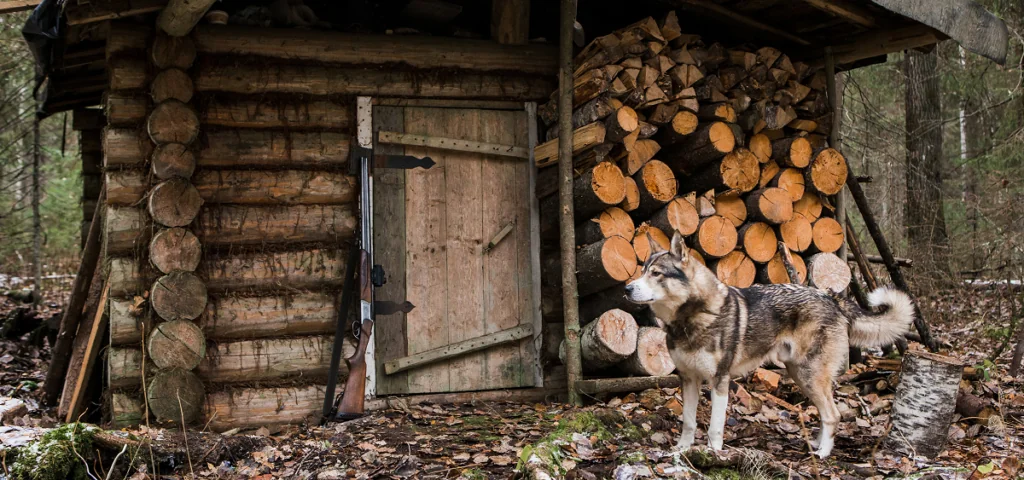According to a report by Radio-Canada, the Quebec government intentionally burned down nearly 180 buildings and other structures illegally occupying public land in 2023, mainly hunting camps. Are you wondering how to legally build a hunting or fishing camp on public land? If so, read on!

Public land covers 92% of Quebec. This territory is considered a natural heritage for the enjoyment of all citizens. It includes controlled harvesting zones, wildlife reserves and refuges, outfitting operations, and national parks, all managed and regulated by specific organizations.
However, there are portions of land that are “free” and are under the responsibility of the ministère des Ressources naturelles et des Forêts (MRNF, or department of natural resources and forests) or a regional county municipality (MRC).
To build a hunting or fishing camp, you need a permit, called a “rough shelter lease”. Essentially, rough shelters are structures in the forest with no permanent foundations.
|
Important! For the past twenty years, it has no longer been possible to obtain new leases from the MRNF or from MRCs. You can, however, take over an existing lease. In fact, there are more than 10,000 rough shelters in Quebec with leases still in effect because they were issued before the suspension of this type of permit. All leases on public land are registered in the Register of the domain of the State (website in French only). |
Changes to the rules
To standardize the rules, the definition of a rough shelter was modified in the Regulation respecting the sale, lease and granting of immovable rights on lands in the domain of the State.
As of September 19, 2024, a rough shelter lease allows the lessee to construct a building or structure used as a shelter, without a permanent foundation and with the following characteristics:
- It has no connected structures other than a shed with a maximum floor area of 6 m2 and a dry-pit toilet without an interior passage to the building or main structure.
- It has no electricity.
- It has no running water.
- Its floor area does not exceed 30 m2.
Although a minority of its members hold rough shelter leases, the Fédération québécoise des chasseurs et des pêcheurs (Quebec federation of hunters and fishers) has made representations to the government to improve their situation, as well as the outdoor experience of users of public land.
Among the gains achieved was an increase in the surface area of rough shelters. Previously, only leases issued in the Abitibi-Témiscamingue region allowed for a surface area of 30 m2, while other regions were limited to 20 m2. Now, all rough shelter lessees are entitled to a 30 m2 surface area.
Authorization to build a shed was also added to the new regulations, according to Michel Baril, a biologist with the Quebec federation of hunters and fishers, in an interview with Éducaloi.
The MNRF has also indicated that “the regulatory changes made will now enable tenants to have an autonomous power supply”. This power supply could be, for example, a solar panel or a generator.
|
Important! A rough shelter lease does not entitle you to exclusive use of a hunting or trapping territory. |
Leases not required in all situations
It’s not necessary to have a rough shelter lease in order to hunt on public lands. The MNRF points out that anyone can hunt on rights-free territory, “provided that the installations are temporary, can be dismantled, and are removed after the activity”.
So, you can opt for a tent for your next hunting expedition on public land.
What if, in addition to your hunting camp, you want to build a tower (also known as a mirador) to observe your game from afar? You don’t need a lease if your structure is dismantled once you’ve finished your activity, according to Michel Baril.
Costs and transfers
As of December 1st, 2024, a person who wants to transfer a rough shelter lease to another person must file an application to request that the Minister sign a new lease with that person. If the original lessee respected all the lease conditions, the Minister must offer to sign the new lease.
Even if the new lease covers the same land and is granted for the same purpose as the original lease, the Minister may modify the rights and obligations of the new lessee.
And how about the cost? With the regulatory changes, the annual rent in all regions of Quebec will be standardized. As of December 1, 2024, the annual rent will be $194, according to the department of natural resources and forests. The rent will then be adjusted on April 1st of each year according to the change in the consumer price index for the previous year.





